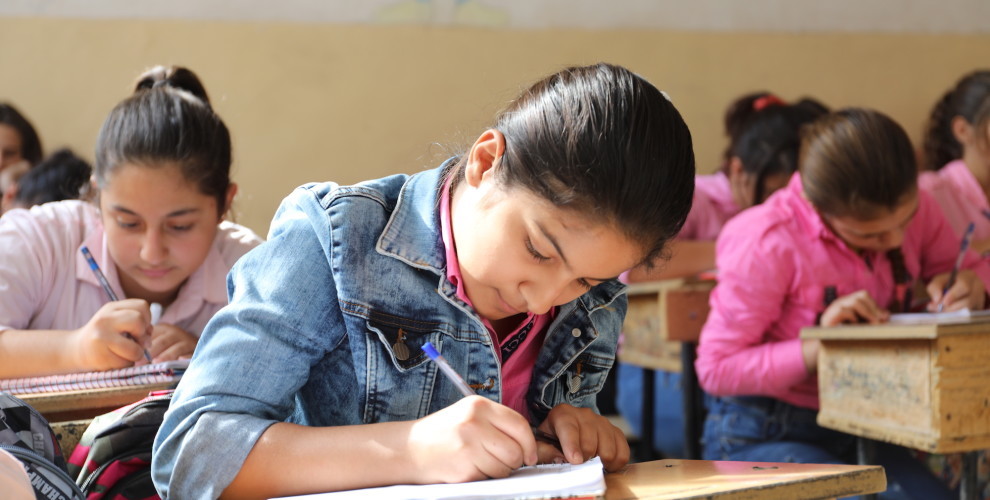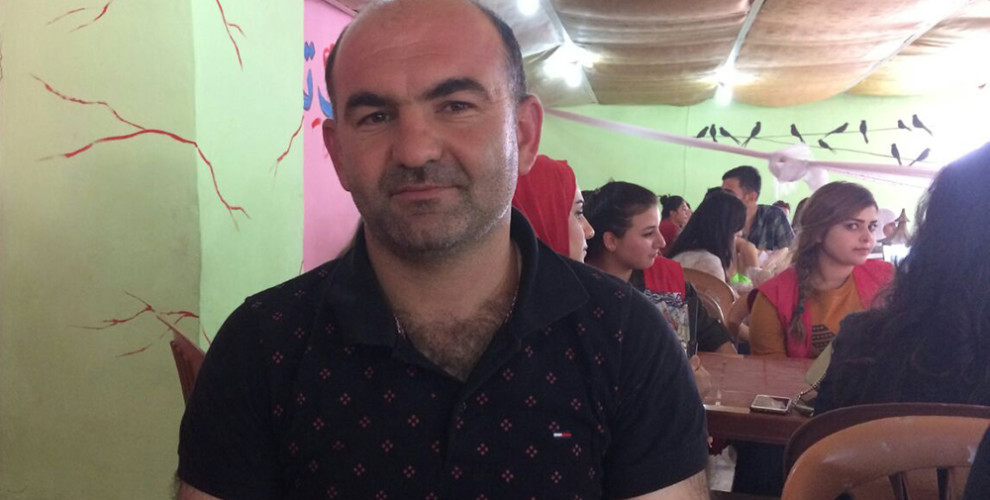The Education System under the Democratic Autonomy Model
Schools are multicultural, multilingual, inclusive and promoting the values of the Democratic Autonomy Model.
Schools are multicultural, multilingual, inclusive and promoting the values of the Democratic Autonomy Model.

Osman Khalil is a member of the School Administration Committee of the Canton of Kobane.
We meet at a ceremony for the beginning of the Education Year at Firat Hall in Kobane. Children wearing traditional clothes are performing local dances before the Education Ministry representatives speeches about the new education year.
Osman Khalil told ANF that in the whole Canton of Kobane there are 1003 schools and over 120,000 students of both primary and secondary education.

During the attacks launched by DAESH, Khalil said, 13 schools were destroyed and after the liberation the Canton immediately started to work to ensure children could restart their education as soon as possible.
“We haven’t been able to build new schools – said Khalil – but we have reformed the ones that were not completely destroyed. The other problem – he added – was the almost complete destruction of school equipments, furniture, school materials. We undoubtedly need to build more school, but we can proudly say that today all children in the Canton have resumed their education”.
The Autonomous Administration has rented private houses and turned them into little schools, where needed. Likewise in rural areas they have put up tents for children to get their lessons there.
The preparation of a new curriculum has been a priority for the Autonomous Administration and the Ministry of Education and Education Committee. “We have elaborated a curriculum – said Khalil – which take into account the new lines given by the Democratic Autonomy model, which is an inclusive model and therefore students are able to study in their mother tongue (which could be Kurdish, Arabic or Syriac) from first grade, while at the same time they are also learning the other two languages of the Canton. Once they have reached 5th grade, they also learn English or French”.
Together with the languages of the Canton, children also learn of the different cultures and ethnical features as well as history of the different nations. “Only the mathematics and sciences books are the same for all kids”, said Khalil who also pointed out to another crucial aspect introduced by the new Autonomous Administration, that is the relation with the parents.
“In regime times – he said – there were virtually no relations between families and the school But now every month there is a meeting. For us it is crucial to create a strong bound and connection among families, students and teachers”. Each family has a representative who participate to all meetings with students and teachers. “Parents can make suggestions and proposals – said Khalil – and in fact this is what we try to promote, because it would help us to improve the education system and the curriculum”.
Clearly, in order to ensure the best implementation of the new curriculum, teachers are asked to join training courses at least once a year to ensure they are well prepared in teaching in a multicultural environment. “We are very strict with the training of teachers – said Khalil – because we want them to be prepared for the new curriculum but also for the new philosophy behind the education system as envisaged by the Democratic Autonomy model. So teachers have 3 months training courses and a final evaluation. Should they fail the evaluation – added Khalil – they will do one more month of training”.
During the war of course children suffered most and the psychological consequences of the conflict must be dealt with also in the school environment. “The most important thing – said Khalil – is to rebuild the children’ identities, personalities, confidence, trust, so we train teachers accordingly, which is why we put much emphasis on the pedagogical side of teaching”.
Another important change in the schools of the Autonomous Administration is that now boys and girls share the same schools, whereas in regime times there were separated schools for boys and girls. “Most teachers – said Khalil – are women, yet most students are boys. We made school compulsory until 9th grade, but we never suspend children. If a student is very weak we will call the family and try to find solutions together so that the student can complete his/her compulsory education”.